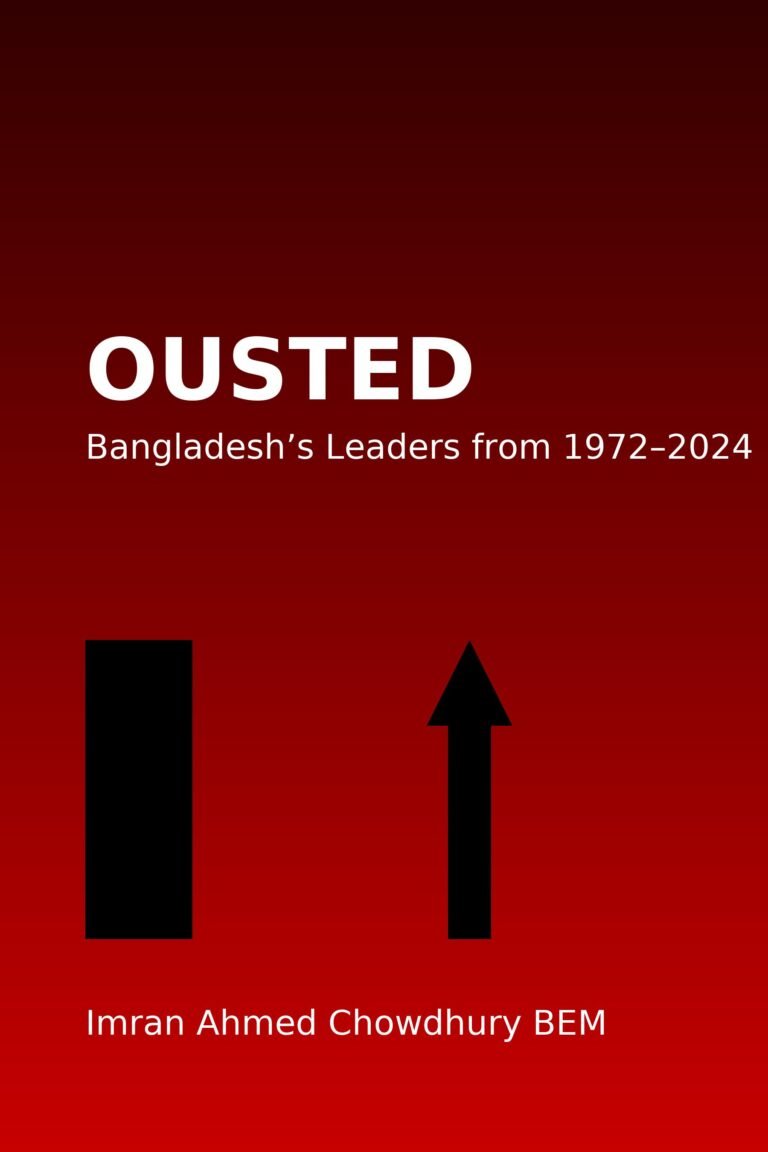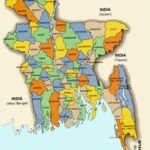Ousted: The Unbroken Chain of Power and Betrayal in Bangladesh (1972–2024)
By Imran Ahmed Chowdhury BEM
www.imranchowdhury.org.uk
For over half a century, Bangladesh has remained a land of miracles and misfortunes — a nation born from the blood of martyrs, yet perpetually wounded by the very power it fought to own. From the thunderous days of 1971 to the turmoil of 2024, every head of government — from presidents to prime ministers, from military rulers to civilian icons — has shared one fate: none left power willingly.
That single truth became the driving force behind my new book, Ousted: Bangladesh’s Leaders from 1972–2024 — How Every Ruler Was Forced from Power. It is a chronicle of our nation’s repeated collapse under the weight of ambition, distrust, and systemic decay.
🔺 The Idea Behind Ousted
Bangladesh’s political story is unlike any other. It began with a war of liberation — a rare revolution built on language, identity, and justice. Yet, the promises of that war have never been fulfilled. I have lived through its rise, its revolts, its betrayals, and its endless transitions. I was a refugee at eleven, a soldier as a young man, and now a chronicler of our unfinished republic.
I wrote Ousted not to condemn individuals, but to understand a pattern — a cycle of ascent and annihilation that defines every chapter of our national leadership. The book examines why no Bangladeshi ruler has ever completed a peaceful handover of power. Why every term of governance ends with a collapse — through bullets, ballots, blood, or betrayal.
⚔️ A Nation That Never Learned to Let Go
Since independence, Bangladesh’s political evolution has followed a tragic rhythm.
-
Sheikh Mujibur Rahman, the Father of the Nation, rose from revolutionary leader to absolute authority — before being assassinated with his family in 1975.
-
Khondaker Mostaq’s treacherous 83 days became a national disgrace.
-
Ziaur Rahman, once hailed as the stabiliser, fell to the same bullets he once commanded.
-
General Ershad, who ruled with military precision, ended up surrendering to a street uprising.
-
Khaleda Zia and Sheikh Hasina—two women who defined post-1990 politics—each faced imprisonment, humiliation, and exile.
-
And General Moeen U Ahmed’s “caretaker” era proved that even without tanks on the streets, a military mind could still govern from the shadows.
Each chapter of the book explores how these moments of crisis were never accidents — they were outcomes of an unbroken cycle:
power gained without accountability, power wielded without restraint, and power lost without grace.
📘 The Hasina Paradox
Perhaps the most complex figure in this chronology is Sheikh Hasina.
Her first term (1996–2001) marked one of Bangladesh’s most successful democratic transitions. She peacefully conceded defeat in a general election — a rare moment of grace in South Asian politics. But her second era (2009–2024) told a darker story — one of economic triumph overshadowed by authoritarian drift.
As I write in the book, Hasina’s final downfall in 2024 was not a simple loss of power — it was a national implosion. Institutions collapsed, the bureaucracy lost moral compass, and the judiciary’s neutrality evaporated. What remained was a nation paralysed between loyalty and survival.
Political analysts, both at home and abroad, continue to debate whether her exit was a genuine people’s uprising or a calculated orchestration by radical and military elements. I leave that question open for readers — because the truth in Bangladesh is rarely singular.
🕯️ The Shadow Ruler
Following Hasina’s fall, I turn to the most enigmatic figure in modern Bangladeshi power—General Moeen U Ahmed, the so-called “Shadow Ruler”.
Between 2007 and 2008, he became the invisible architect of a “managed democracy”, where the army governed indirectly through a caretaker façade. Moeen, a product of Pakistani cadet culture and a former Pakistan Air Force officer, imported the psychology of military guardianship into Bangladeshi politics.
His “Minus Two Policy” sought to erase both Sheikh Hasina and Khaleda Zia from the political landscape—a failed social experiment that nearly destroyed the state’s democratic structure. He proved one chilling truth: Bangladesh could be ruled without formally declaring a coup.
📉 The Cost of Instability
Throughout Ousted, one theme runs like a wound through the pages — the institutional collapse of moral authority.
Every administration, whether civilian or military, has weakened the organs meant to sustain democracy. The bureaucracy learnt to serve individuals, not the republic. The executive became synonymous with survival. Parliament turned into an echo chamber, and the judiciary lost its independence under the weight of political loyalty.
This is not merely politics — it is a systemic erosion of trust.
The tragedy of Bangladesh is not that leaders fall. It is that no institution remains strong enough to protect the people when they do.
🌍 Why the World Should Care
Bangladesh is not an isolated experiment in instability. It stands at the crossroads of South Asian geopolitics — bordered by India, influenced by China, observed by the United States, and courted by the Islamic world. Each leadership change reshapes regional alliances.
When Bangladesh falters, extremists find space, refugees move, trade routes shift, and South Asia trembles. The question of governance in Dhaka is not a domestic concern — it is a global one.
That is why Ousted is more than a chronicle of coups and collapses. It is a warning about what happens when democracy becomes procedural instead of moral and when governance forgets its human cost.
✒️ Why I Wrote Ousted
As a former army officer, I was trained to believe in discipline, loyalty, and order. As a child refugee, I learnt that survival demands empathy and truth. As a writer, I feel bound to record the lessons our nation keeps forgetting.
I wrote this book because Bangladesh deserves to remember — not to glorify leaders or vilify them, but to understand why power keeps devouring itself.
I dedicate it to the freedom fighters of 1971 and to every Bangladeshi who has seen hope rise and collapse, again and again.
📣 A Call to Reflection
Fifty-three years after independence, we must ask ourselves:
-
Why have we never allowed a government to end with dignity?
-
Why do we continue to destroy what we build?
-
Why do we forget that sovereignty is not power — it is responsibility?
Ousted is not just a political book. It is a mirror held up to our conscience. It challenges us to imagine a Bangladesh that breaks the curse of forced departures — a nation that can finally celebrate a peaceful transfer of power.
Only when that happens will the bloodshedin 1971 find its true meaning.
📗 Ousted: Bangladesh’s Leaders from 1972 to 2024
By Imran Ahmed Chowdhury BEM
Available soon on Amazon Kindle & Paperback
🔗 Visit: www.imranchowdhury.org.uk
📧 Contact: imranchowdhury@icloud.com
“Bangladesh has defeated empires and dictators —
but its final victory will come only when power changes hands peacefully.”



